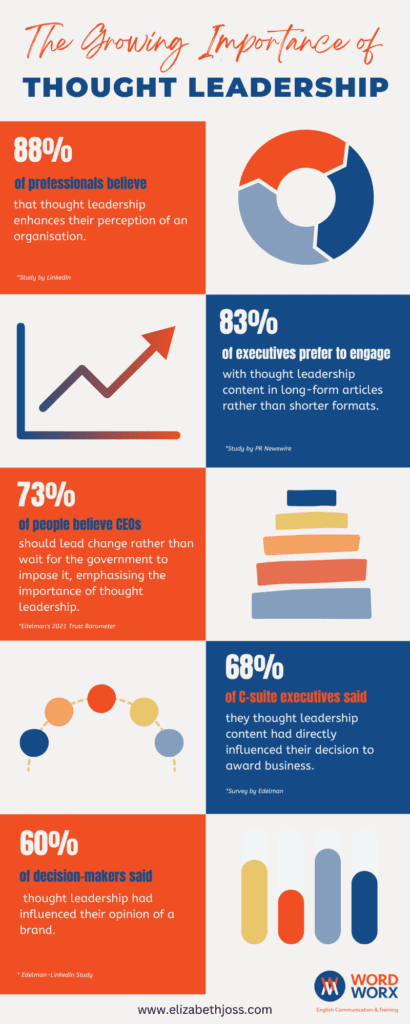Nowadays, we’re seeing the growing importance of Thought Leadership stories — especially considering the rise of AI-generated content.
I’ve compiled the below statistics and infographic, which show the significant impact and value that thought leadership stories can have on building trust and credibility, influencing decision-making, driving revenue growth, and attracting top talent:
According to a study by LinkedIn, 88% of professionals believe that thought leadership enhances their perception of an organisation.
According to a study by PR Newswire, 83% of executives prefer to engage with thought leadership content in long-form articles rather than shorter formats.
A survey by Forbes Insights and Deloitte found that 82% of executives prefer to work with thought leaders who have developed a clear vision.
According to Edelman’s 2021 Trust Barometer, 73% of people believe CEOs should lead change rather than wait for the government to impose it, emphasising the importance of thought leadership.
In a survey by Edelman, 68% of C-suite executives said they thought leadership content had directly influenced their decision to award business.
Thought leadership can strengthen brand reputation. The Edelman-LinkedIn study found that 60% of decision-makers said thought leadership had influenced their opinion of a brand.
B2B buyers highly value thought leadership content. A study by Edelman and LinkedIn showed that 58% of decision-makers spend at least one hour per week reading thought leadership content.
Thought leadership can significantly impact revenue growth. A study by LinkedIn found that 58% of companies that invested in thought leadership experienced increased market share.
Thought leadership stories drive customer loyalty. Research by LinkedIn revealed that 58% of decision-makers said thought leadership content had directly led them to award business to an organisation they were not considering.
Thought leadership can attract top talent. A LinkedIn study found that 58% of professionals consider thought leadership when deciding where to work.
Thought leadership content generates trust and credibility. In a study by LinkedIn, 55% of decision-makers said they use thought leadership as a way to vet organisations they may hire.
In a study by Google and CEB, 50% of B2B buyers said they are more likely to make a purchase if they see personal value in a business case presented by a thought leader.
According to a study by the Financial Times, 47% of senior executives reported that thought leadership directly influenced a purchasing decision.
HubSpot reports that 46% of marketers believe thought leadership is critical for establishing an organisation’s authority in its industry.
Are you keen to learn more about the growing importance of thought leadership stories? And would you like to possibly kickstart thought leadership content within your marketing and communication department? Contact Elizabeth today to learn more about how I support companies in Thought Leadership content: info@elizabethjoss.com.

